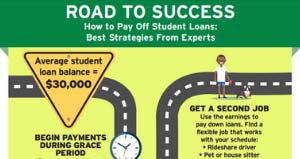How to Pay Off Student Loans: Best Strategies From Experts

Graduating from college and starting a career is a major milestone. Welcome to adulthood! Now that you're earning a regular paycheck you probably have a long list of things to buy with your hard-earned cash. Whether it's renting a first apartment, buying a shiny new car, or traveling to exotic destinations unknown, you probably also have student loans to repay.
The average college student graduates with a degree and about $30,000 in student loans. The standard repayment period for federal loans is 10 years. However, according to the Department of Education, it takes more than 20 years for the average borrower to pay back loans totaling between $20,000 and $40,000.
That's a long time. But what if you could repay the loans quicker and not incur as much in interest costs? After all, there are no prepayment penalties on federal or private student loans. We'll start with an easy decision that will save you money right away, and put you on the road to success.
Take Advantage of an Autopay Discount
Many lenders will offer a discount on interest if you enroll in automatic bank payments from your checking account. You could get a reduction of 0.25 percent from your interest rate just for signing up for autopay. It will also help you avoid making a late payment or missing a month altogether.
Begin Payments During the Grace Period
Most student loans have a grace period of six months after you graduate or cease being enrolled as a full-time student. The provider for each loan will send you a repayment schedule, tell you how much you'll need to pay every month and determine when the monthly payments will begin.
During the grace period, you don't have to make any payments, but you can. Starting the repayment process early will save you money in interest over the life of the loan. Especially if you graduated from school with a good job waiting for you, the sooner you start paying off student loans, the sooner you won't have to worry about them anymore.
Refinance Student Loans
Most students leave college with a combination of federal and private loans. Refinancing allows you to combine all your loans into one loan, with just one monthly payment to manage. Refinancing will also allow you to shop around for a lower interest rate, which will save you money on the interest of your loans.
What you will need to refinance:
- A job - Lenders want to know you have a steady income to make monthly payments.
- Strong credit score - A score of 650 or higher is required by most lenders.
- History of financial responsibility - A history of on-time payments shows you're a good credit risk and can meet your financial obligations.
If you don't have the financial requirements to refinance right now, keep working to strengthen your credit-worthiness for the future. You can also consider asking someone with a stronger credit profile, such as a parent, to co-sign the loan.

Pay a Little Extra Each Month
If you don't have a budget, this is the perfect time to create one. Can you find an extra $100 a month to pay down your student loans? Sit down and look at all your expenses, paying special attention to needs and wants:
- Rent
- Transportation
- Student loan payment
- Food
- Utilities
- Clothing
- Entertainment
Since it wasn't too long ago that you were a cash-strapped college student, surviving on ramen noodles and cereal, you have some tips and tricks to stretch a dollar. Don't lose that gift. Make it work in your favor to tighten your budget and find an extra $100 a month.
For example, say you have $30,000 in loans, at 6 percent interest, and are currently making payments of $325 a month. At that rate, you would pay off your loans in about 10 years. However, if you paid an extra $100 a month, you could pay off your loans in seven years and save $3,325 in interest.
If you do choose to send in extra money, make sure it gets applied to the loan principal. Some providers will apply the extra money to your regular payment, which will advance the next month's due date. So make sure the $100 is applied directly to the balance.
Take Advantage of Raises, Bonuses, and Tax Refunds
You work very hard for raises and bonuses at work, so why not let that money work for you? If you get a three percent raise at work, shift some or all of your raise to paying off student loans.
Did you get an end-of-year bonus, or a really good sales commission check last month? Tax season is just around the corner; are you expecting to get a tax refund? Bonuses and tax refunds are two great opportunities to make extra one-time payments to pay down your loans. Every little bit helps.
Get a Second Job
Finding a part-time job to make extra money doesn't have to mean flipping burgers or working at the 24-hour gas station. There are many jobs with flexible hours that could fit into your schedule:
- Rideshare driver
- Pet or house sitter
- Website designer
- Freelance writer
Try setting a goal to earn an extra $100-$200 a month. Once you reach that goal, take the rest of the month off and put the earnings toward paying off your student loans quicker.
When Things Don’t Go As Planned
Even with the best-laid plans, one day you may find yourself out of a job. Most loan service providers will work with you. If you think you're going to miss a payment or you do miss a payment one month, call and find out your options.
The company can't help if they don't know what's going on. After three missed payments the loan is considered delinquent, and the servicer will report it to the three major credit agencies. You don't want your credit rating to take a hit because you didn't pick up the phone.
You may also qualify for student loan deferment while you look for a new job. A deferment can be used to temporarily postpone your payments. But again, the loan company can't help if you don't tell them what's going on. The key is to communicate and stay positive.